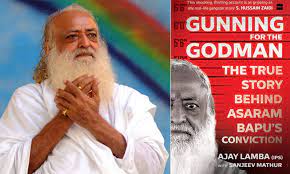Delhi Court dismisses plea seeking injunction against publication of book “Gunning for the Godman” related to Asaram Bapu

The court dismissed the plea stating that there cannot be more than one decree or operative order governing the same subject matter at a given time and it is the decree or the order of the superior court which is final and operative.
A Delhi Court recently dismissed a plea seeking an ex-parte ad-interim injunction against the publication and sale of a book by HarperCollins related to the conviction of the self-styled Godman Asaram Bapu.
While dismissing the plea filed by the plaintiff in September 2020 against the book titled “Gunning for the Godman: The true story behind Asaram Bapu’s Conviction”, Additional District Judge (ADJ) Sudhanshu Kaushik of the Patiala House Court observed:
“The High Court of Delhi vide order dated 22.09.2020, passed detailed directions to balance the rights of the parties during the pendency of the suit. This order was passed on merits after hearing from all the affected parties. In terms of this order, the High Court has dealt with all the respective contentions. The arguments raised before this court are akin to the arguments raised by the parties before the High Court of Delhi. It would be a matter of judicial impropriety to re-appreciate these contentions. The same is forbidden in view of the doctrine of merger. Accordingly, the application under Order XXXIX Rule 1 & 2 of CPC stands disposed of in terms of the order dated 22.09.2020 passed by the High Court of Delhi.”
The book revolves around Asumal Harpalani, also known as Asaram Bapu, who was convicted on April 25, 2018, by a Special Court (POCSO Act), Jodhpur, Rajasthan for the offences punishable under Section 342, 370 (4), 120B, 376D, 376 (2)(F) and 509 of the Indian Penal Code read with Section 23 of the Juvenile Justice Act (Care and Protection of Children) Act 2000 for sexually assaulting a minor girl.
The plaintiff Sanchita Gupta was the warden of an Ashram run by Asaram Bapu, the same order also convicted her for committing offences punishable under Section 370(4), 376D read with Section 120B of IPC. She alleged that the book contained false and defamatory statements that would harm her reputation.
She claimed that the book, as well as the articles published by Scroll Media Inc. and Harpercollins Publishers India Pvt. Ltd., portrayed her negatively and harmed her reputation in the eyes of her acquaintances and the general public.
Notably, in September 2020, an ex-parte injunction was granted against the publication of the book. Thereafter an appeal titled “Harper Collins Publishers India Pvt. Ltd. v. Sanchita Gupta&Shilpi & Ors.” was filed before the Delhi High Court and the same was vacated by the court vide order dated September 22, 2020. Subsequently, the company was permitted to publish the book along with a disclaimer:
“That the story was based upon the judgment convicting the accused should be printed separately on a flier and stuck either on the inside of the front cover or the inside of the back cover of the book or a note may be put to the effect that the appeal of plaintiff is pending before the Rajasthan High Court and her sentence has been suspended till disposal of the appeal.”
Underlining the logic of the Doctrine of Merger, the ADJ stated that there cannot be more than one decree or operative order governing the same subject matter at a given point of time and it is the decree or the order of the superior court which is final and operative.
“The doctrine of merger applies to judgments as well as orders passed by the superior forum. The order of the lower court merges with the order of the superior courts irrespective of the fact whether the order has been modified, reserved or affirmed by the superior forum”, the ADJ added.
Taking note of the Delhi High Court order of September 2020, the court dismissed the plaintiff’s application and clarified that the observations made in the present order are only for the purpose of adjudicating the prayer of whether an injunction should be granted during the pendency of the suit and shall have no bearing on the outcome of the trial.
Doctrine of Merger
Doctrine of Merger is a common law doctrine that is founded on the principles of propriety in the hierarchy of the justice delivery system. The underlying logic of the Doctrine of Merger is that there cannot be more than one decree or an operative order governing the same subject matter at a given point in time.
Case Title: Sanchita Gupta@ Shilpi v. Scroll Media & Ors.
Statue: The Code of Civil Procedure; The Indian Penal Code; The Juvenile Justice Act (Care and Protection of Children) Act; The Prevention of Children from Sexual Offences Act
